Module 3 Body Language and Non-Verbal Communication Writing Everyday English and Function
文档属性
| 名称 | Module 3 Body Language and Non-Verbal Communication Writing Everyday English and Function |
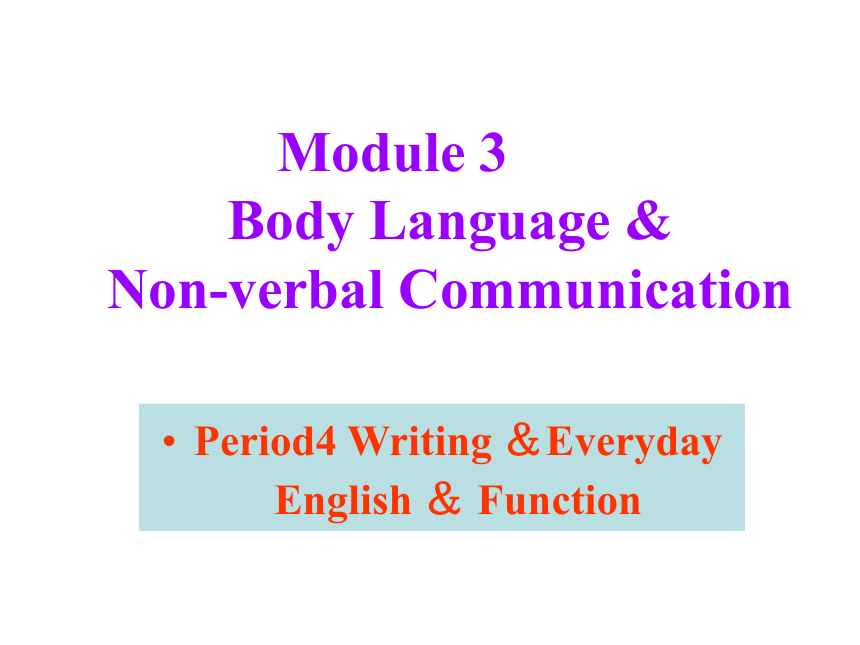
|
|
| 格式 | rar | ||
| 文件大小 | 792.8KB | ||
| 资源类型 | 教案 | ||
| 版本资源 | 外研版 | ||
| 科目 | 英语 | ||
| 更新时间 | 2011-04-26 00:00:00 | ||
图片预览

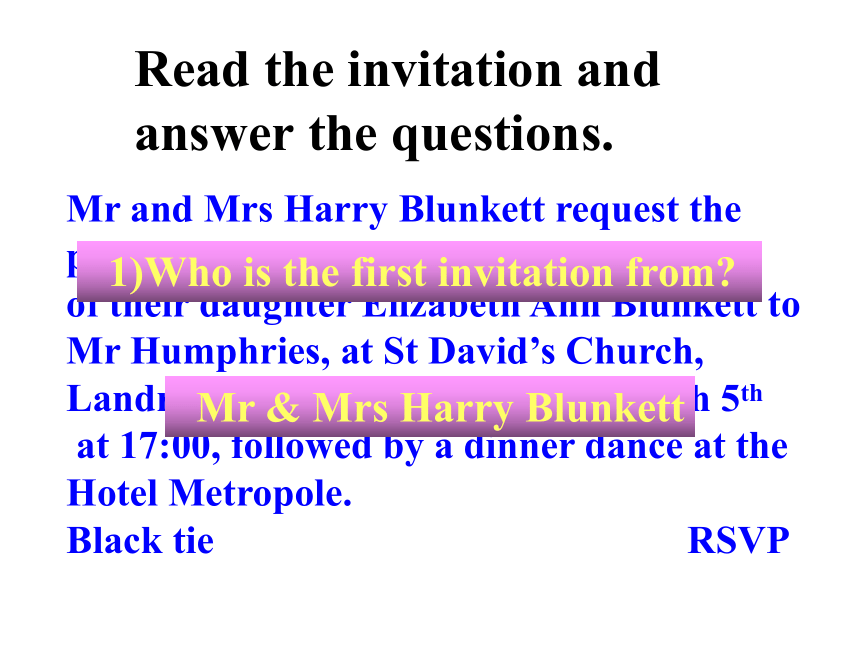
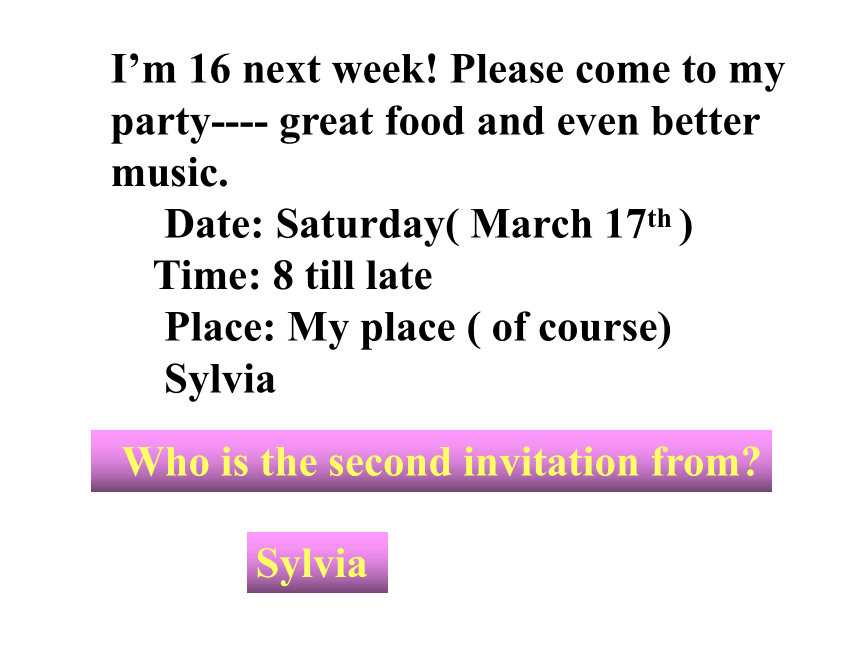
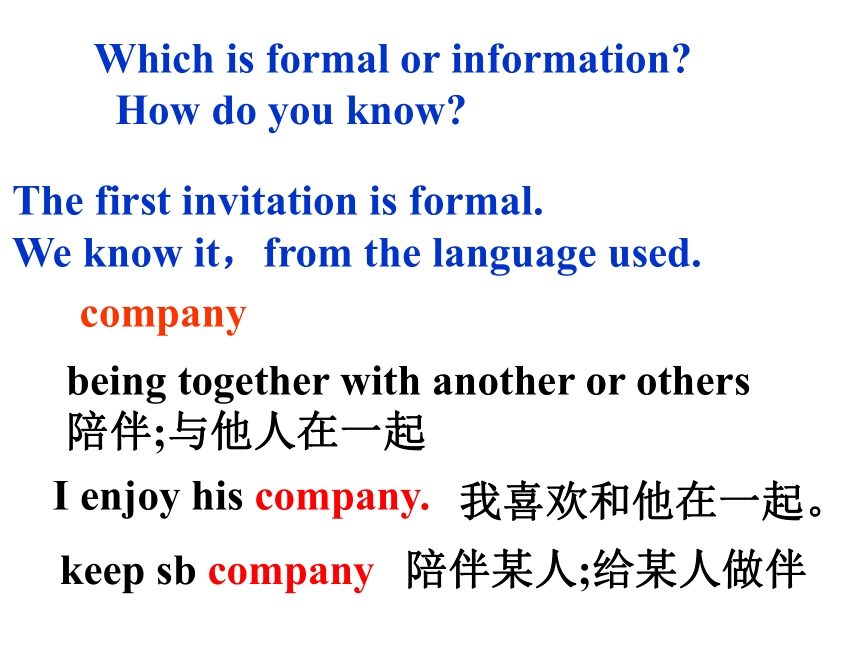
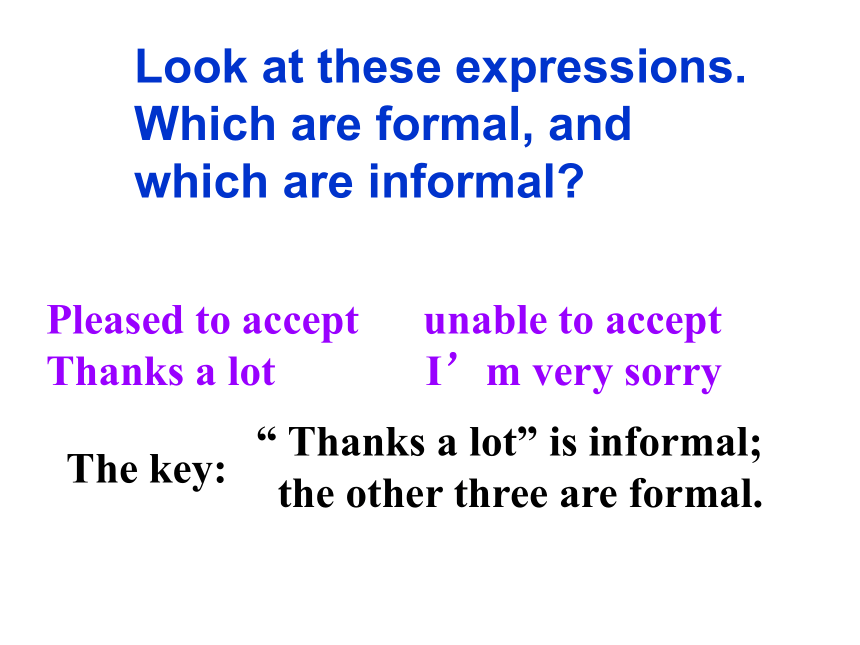
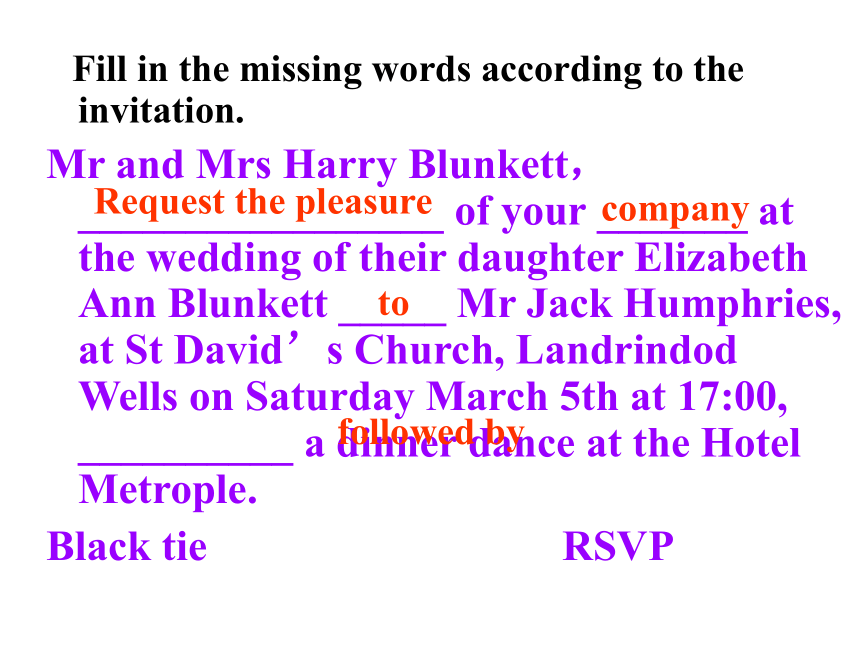
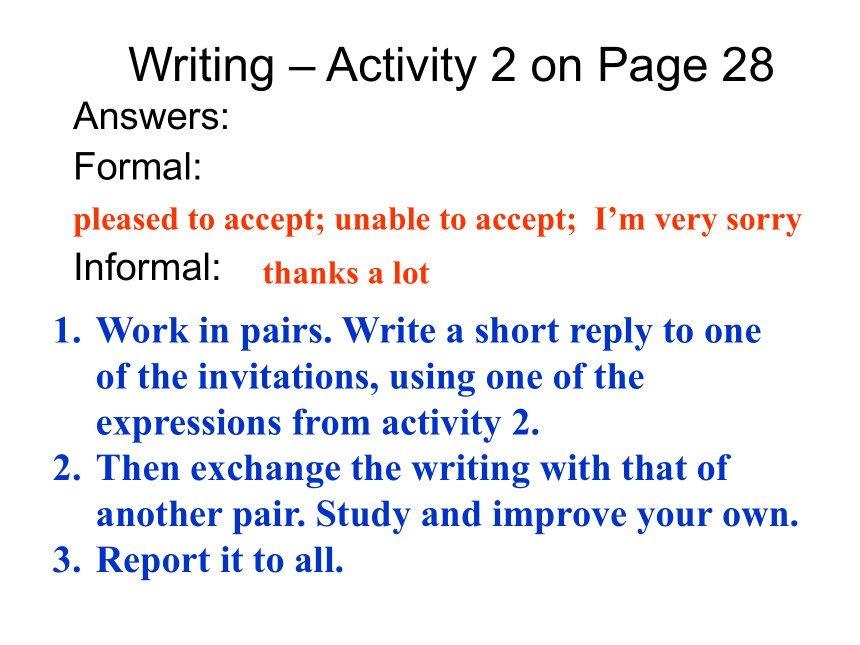
文档简介
课件14张PPT。Module 3
Body Language &
Non-verbal CommunicationPeriod4 Writing &Everyday English & Function Read the invitation and answer the questions.Mr and Mrs Harry Blunkett request the
pleasure of your company at the wedding
of their daughter Elizabeth Ann Blunkett to
Mr Humphries, at St David’s Church,
Landrindod Wells on Saturday March 5th
at 17:00, followed by a dinner dance at the
Hotel Metropole.
Black tie RSVP 1)Who is the first invitation from???Mr & Mrs Harry Blunkett I’m 16 next week! Please come to my
party---- great food and even better
music.
Date: Saturday( March 17th )
Time: 8 till late
Place: My place ( of course)
Sylvia
? Who is the second invitation from?Sylvia Which is formal or information?
How do you know?The first invitation is formal.
We know it,from the language used.being together with another or others
陪伴;与他人在一起 I enjoy his company. company我喜欢和他在一起。 keep sb company 陪伴某人;给某人做伴 Look at these expressions. Which are formal, and which are informal?Pleased to accept unable to accept
Thanks a lot I’m very sorryThe key: “ Thanks a lot” is informal;
the other three are formal.
Fill in the missing words according to the invitation.
Mr and Mrs Harry Blunkett, _________________ of your _______ at the wedding of their daughter Elizabeth Ann Blunkett _____ Mr Jack Humphries, at St David’s Church, Landrindod Wells on Saturday March 5th at 17:00, __________ a dinner dance at the Hotel Metrople.
Black tie RSVPRequest the pleasurecompanytofollowed byWriting – Activity 2 on Page 28Answers:
Formal:
Informal:thanks a lotpleased to accept; unable to accept; I’m very sorryWork in pairs. Write a short reply to one of the invitations, using one of the expressions from activity 2.
Then exchange the writing with that of another pair. Study and improve your own.
Report it to all.What's the meaning?1. Can I ask you a favour?
(a) Can I do something for you?
(b) Can you do something for me?
2. How are you doing?
(a) How are you?
(b) What are you doing?3. What on earth can I talk about?
(a) There’s lots to talk about.
(b) I don’t know what to talk about.
4. Have a great time!
(a) Enjoy yourself.
(b) Stay a long time.Function Should or must?
You _______ shake hands when you
meet new people.
You ________thank your host for a wonderful evening.shouldmustQ: Which one means…?
It’s a good idea to…
It’s very important to…shouldmustConclusion:
Should: give advice; must: give strong advice should, shouldn’t, must or mustn’t
In France you ______ shake hands every time you say hello and goodbye.
In Thailand you ________ touch someone on the head, even by accident.
In Spain you ______ wait until 10 pm before you have dinner.
In Japan you ________ give a penknife as a present.
In Russia you _______ make a toast every time you take a sip from your glass.shouldmustn’tshouldshouldn’tmustSpeaking – Role-play on P27.Work in pairs. Do the role-play.
Student A: An American visitor to China. Ask B for advice on Chinese customs.
Student B: A Chinese student. Student A’s friend. Give B advice using should or must or sentences beginning with if.Situations:
be introduced to others; be invited;
meet someone familiar; talk to people;
say goodbye…… Write a passage, introducing the customs in the US with the help of the advice given in Activity 4 in Listening (P25). Homework
Body Language &
Non-verbal CommunicationPeriod4 Writing &Everyday English & Function Read the invitation and answer the questions.Mr and Mrs Harry Blunkett request the
pleasure of your company at the wedding
of their daughter Elizabeth Ann Blunkett to
Mr Humphries, at St David’s Church,
Landrindod Wells on Saturday March 5th
at 17:00, followed by a dinner dance at the
Hotel Metropole.
Black tie RSVP 1)Who is the first invitation from???Mr & Mrs Harry Blunkett I’m 16 next week! Please come to my
party---- great food and even better
music.
Date: Saturday( March 17th )
Time: 8 till late
Place: My place ( of course)
Sylvia
? Who is the second invitation from?Sylvia Which is formal or information?
How do you know?The first invitation is formal.
We know it,from the language used.being together with another or others
陪伴;与他人在一起 I enjoy his company. company我喜欢和他在一起。 keep sb company 陪伴某人;给某人做伴 Look at these expressions. Which are formal, and which are informal?Pleased to accept unable to accept
Thanks a lot I’m very sorryThe key: “ Thanks a lot” is informal;
the other three are formal.
Fill in the missing words according to the invitation.
Mr and Mrs Harry Blunkett, _________________ of your _______ at the wedding of their daughter Elizabeth Ann Blunkett _____ Mr Jack Humphries, at St David’s Church, Landrindod Wells on Saturday March 5th at 17:00, __________ a dinner dance at the Hotel Metrople.
Black tie RSVPRequest the pleasurecompanytofollowed byWriting – Activity 2 on Page 28Answers:
Formal:
Informal:thanks a lotpleased to accept; unable to accept; I’m very sorryWork in pairs. Write a short reply to one of the invitations, using one of the expressions from activity 2.
Then exchange the writing with that of another pair. Study and improve your own.
Report it to all.What's the meaning?1. Can I ask you a favour?
(a) Can I do something for you?
(b) Can you do something for me?
2. How are you doing?
(a) How are you?
(b) What are you doing?3. What on earth can I talk about?
(a) There’s lots to talk about.
(b) I don’t know what to talk about.
4. Have a great time!
(a) Enjoy yourself.
(b) Stay a long time.Function Should or must?
You _______ shake hands when you
meet new people.
You ________thank your host for a wonderful evening.shouldmustQ: Which one means…?
It’s a good idea to…
It’s very important to…shouldmustConclusion:
Should: give advice; must: give strong advice should, shouldn’t, must or mustn’t
In France you ______ shake hands every time you say hello and goodbye.
In Thailand you ________ touch someone on the head, even by accident.
In Spain you ______ wait until 10 pm before you have dinner.
In Japan you ________ give a penknife as a present.
In Russia you _______ make a toast every time you take a sip from your glass.shouldmustn’tshouldshouldn’tmustSpeaking – Role-play on P27.Work in pairs. Do the role-play.
Student A: An American visitor to China. Ask B for advice on Chinese customs.
Student B: A Chinese student. Student A’s friend. Give B advice using should or must or sentences beginning with if.Situations:
be introduced to others; be invited;
meet someone familiar; talk to people;
say goodbye…… Write a passage, introducing the customs in the US with the help of the advice given in Activity 4 in Listening (P25). Homework
